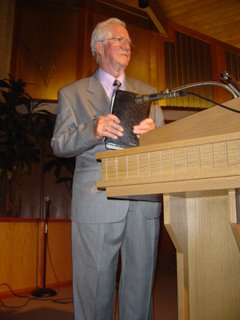 I received a comment from one of my sisters recently. She had recently read my article "Where I blew it with my children: A Father's recompense." (You can read her comment there). In my Journey To Orthodoxy I have refrained from discussing these things with any of my family members because I innately understood the propensity for my relatives to internalize my comments, making them a personal affront to their spirituality. (But alas, with this BLOG the cat is out of the bag.) Such is the nature of any dogmatic discussion, but more so when those you love are involved. One who makes this journey must expect to wade through a myriad of emotional responses, personal accusations, misread intentions, and extremes. I am an idealist at heart and an analytical thinker. I often make the miscalculation that others approach a discourse in the same way. I am often disappointed when that doesn't occur. For instance: The doctrinal theme of my article was: God as Punisher vs. God as Redeemer, The Total Depravity of Man vs. The Damaged Soul of Man. My sister wondered "what parents I had" and if I was saying she "was going to Hell". I fully understand the conclusions she has drawn but also see them as very unfortunate. I, too, saw my Protestant parents as loving and caring-the best in many ways. They brought me up in the church and taught me the respect of God and the meaning of life. It was my father who taught me the gospel message.
I received a comment from one of my sisters recently. She had recently read my article "Where I blew it with my children: A Father's recompense." (You can read her comment there). In my Journey To Orthodoxy I have refrained from discussing these things with any of my family members because I innately understood the propensity for my relatives to internalize my comments, making them a personal affront to their spirituality. (But alas, with this BLOG the cat is out of the bag.) Such is the nature of any dogmatic discussion, but more so when those you love are involved. One who makes this journey must expect to wade through a myriad of emotional responses, personal accusations, misread intentions, and extremes. I am an idealist at heart and an analytical thinker. I often make the miscalculation that others approach a discourse in the same way. I am often disappointed when that doesn't occur. For instance: The doctrinal theme of my article was: God as Punisher vs. God as Redeemer, The Total Depravity of Man vs. The Damaged Soul of Man. My sister wondered "what parents I had" and if I was saying she "was going to Hell". I fully understand the conclusions she has drawn but also see them as very unfortunate. I, too, saw my Protestant parents as loving and caring-the best in many ways. They brought me up in the church and taught me the respect of God and the meaning of life. It was my father who taught me the gospel message. It was my mother who showed me what it was to be a servant. I do not credit them for any of my weaknesses or propensity to sin. However, my journey has held a unique dilemma. My father was also my pastor and it was from his pulpit, among other venues, that I gained my understanding of doctrine and world view. The fact is, Baptists believe and teach through the doctrinal filter that man is totally depraved, as guilty as Adam and Eve and God is the punisher of sin. Although there is a measure of truth to these things, this is not the Orthodox Faith or ethos (Please reread the article for comparisons). To say that I heard these things preached throughout my life is a fact, to say that I am indicting my parents as the personal perpetrators of this doctrine in my life is not. It is a puzzling dichotomy that the home and the church should have two such differing influences. But in my case as a preacher's kid it is reasonable that I would not be able to separate the two.
It was my mother who showed me what it was to be a servant. I do not credit them for any of my weaknesses or propensity to sin. However, my journey has held a unique dilemma. My father was also my pastor and it was from his pulpit, among other venues, that I gained my understanding of doctrine and world view. The fact is, Baptists believe and teach through the doctrinal filter that man is totally depraved, as guilty as Adam and Eve and God is the punisher of sin. Although there is a measure of truth to these things, this is not the Orthodox Faith or ethos (Please reread the article for comparisons). To say that I heard these things preached throughout my life is a fact, to say that I am indicting my parents as the personal perpetrators of this doctrine in my life is not. It is a puzzling dichotomy that the home and the church should have two such differing influences. But in my case as a preacher's kid it is reasonable that I would not be able to separate the two.
I do not have the right to characterize the state of anyone's soul, thus their eternal destiny. I do not even have the right to my own personal doctrinal opinions. That is not Orthodox. What I do have is the responsibility to seek out the truth of the undivided church, that which was "taught at all times, in all places, by all the Church". That is Orthodox. By necessity, some of these discoveries will smack in the face of some Protestant doctrinal stances and ideologies and therefore smack in the face of those family members who still hold to them. Smacking is not the heart or intent nor is it the Orthodox ethos. I have found the Orthodox ethos to be one of love and inclusion. For instance, when I was received into the Church, my baptism was accepted as authentic. This was the baptism by immersion administered by my own father. Entry in to the Orthodox faith "completed" what was begun in my years o f Protestantism (*See UPDATE Below). Orthodoxy means "right belief". One aspect of that belief is the reticence to condemn other Christian individuals or groups. But another aspect is to proclaim loudly the Faith of the Apostles. It is in that proclaiming that the fires of dissent can ignite. The attitude of the Orthodox Christian should be "I know where the Church is but I don't know where it isn't". One can only hope to continue a dialogue with those relatives who will, and pray that there will be an absence of inferences and accusations and that no one brings a box of matches. It may be a formidable task, however, because "It's all relative."
f Protestantism (*See UPDATE Below). Orthodoxy means "right belief". One aspect of that belief is the reticence to condemn other Christian individuals or groups. But another aspect is to proclaim loudly the Faith of the Apostles. It is in that proclaiming that the fires of dissent can ignite. The attitude of the Orthodox Christian should be "I know where the Church is but I don't know where it isn't". One can only hope to continue a dialogue with those relatives who will, and pray that there will be an absence of inferences and accusations and that no one brings a box of matches. It may be a formidable task, however, because "It's all relative."
* UPDATE 7/21/14: This article was originally written on 6/6/06. I subsequently learned that, although the reception of my Baptist baptism may have been a sign of "love and inclusion" by the Antiochians, that practice is highly irregular and is not in keeping with the canons of the church. For more on this read Why We Left, Where We Went.
 f Protestantism (*See UPDATE Below). Orthodoxy means "right belief". One aspect of that belief is the reticence to condemn other Christian individuals or groups. But another aspect is to proclaim loudly the Faith of the Apostles. It is in that proclaiming that the fires of dissent can ignite. The attitude of the Orthodox Christian should be "I know where the Church is but I don't know where it isn't". One can only hope to continue a dialogue with those relatives who will, and pray that there will be an absence of inferences and accusations and that no one brings a box of matches. It may be a formidable task, however, because "It's all relative."
f Protestantism (*See UPDATE Below). Orthodoxy means "right belief". One aspect of that belief is the reticence to condemn other Christian individuals or groups. But another aspect is to proclaim loudly the Faith of the Apostles. It is in that proclaiming that the fires of dissent can ignite. The attitude of the Orthodox Christian should be "I know where the Church is but I don't know where it isn't". One can only hope to continue a dialogue with those relatives who will, and pray that there will be an absence of inferences and accusations and that no one brings a box of matches. It may be a formidable task, however, because "It's all relative."* UPDATE 7/21/14: This article was originally written on 6/6/06. I subsequently learned that, although the reception of my Baptist baptism may have been a sign of "love and inclusion" by the Antiochians, that practice is highly irregular and is not in keeping with the canons of the church. For more on this read Why We Left, Where We Went.
No comments:
Post a Comment
Welcome to JTO. Feel free to comment. Comments containing ad hominems will be deleted.